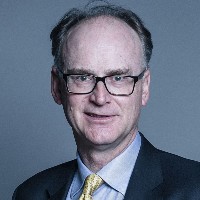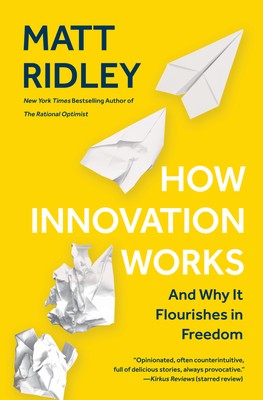
By Andy Brack, editor and publisher | British thinker and science writer Matt Ridley has a reminder for anyone looking for a quick fix for coronavirus: Innovation takes time.
 In what may be the most impactful and important non-fiction book of the year, Ridley’s “How Innovation Works” says we’ll eventually figure out how to deal with the deadly virus, but it won’t happen overnight.
In what may be the most impactful and important non-fiction book of the year, Ridley’s “How Innovation Works” says we’ll eventually figure out how to deal with the deadly virus, but it won’t happen overnight.
“As always with innovation, trial and error will decide, but the chances that none of them [potential cures] can cure or ameliorate this disease are small,” writes Ridley in a new afterword of the book, first published in May. “One way or another we will eventually escape from this nightmare and resume economic activity.”
Ridley is an award-winning writer who also happens to be a libertarian and member of Britain’s House of Lords. A columnist for The Times of London and The Wall Street Journal, he collects and interprets research on science, economics and prosperity to explain complicated stuff, such as how ideas and innovation power our society.

What’s most compelling about his new book is it has a pretty clear lesson for anybody who suggests a COVID-19 cure is just around the corner. It may be, he says. But again, it also may not be — because innovation works on its own schedule.
For us, the book teaches any politician or pundit who promises an antiviral therapy, vaccine or miracle cure by the end of the year is either filled with malarkey or spinning political hocus-pocus in what is, remember, an election year. Don’t be shocked if there’s some kind of pandering political surprise in October.
Right now, what’s most worrisome, Ridley warns, is that our current way of developing something like a vaccine is too cumbersome and expensive, often punctuated with bureaucratic hurdles and medical landmines. Governments tend, he says, to get in the way of private companies that can innovate. But in an unfortunate twist, those very same companies generally don’t spend enough time developing vaccines because it’s expensive and not profitable in the short term.
“By far the biggest failure of the 2020 pandemic is the failure to have done enough innovation in the field of vaccines,” Ridley wrote.
He explains the difference between innovation and invention by using a quote from Charles Townes (1915-2015), a Nobel Prize-winning physicist born in Greenville who was critical in the development of the laster.
 Townes often pointed to an old cartoon of a beaver and a rabbit looking at the Hoover Dam, Ridley wrote. “‘No, I didn’t build it myself,’ says the beaver. ‘But it’s based on an idea of mine.’” An inventor, Ridley explains, may come up with a really good idea that solves a huge problem, such as how to use steam to power an engine or how to use electricity to produce light. But an innovator, through hard work, perspiration, determination and sheer force of will, ferrets out how to make it work in an affordable, easy-to-use manner. For example, several inventors figured out how to make a light bulb, but it took innovator Thomas Edison and his team of scientists to test more than 6,000 plant materials to find the ideal carbon filament to make a bulb really work.
Townes often pointed to an old cartoon of a beaver and a rabbit looking at the Hoover Dam, Ridley wrote. “‘No, I didn’t build it myself,’ says the beaver. ‘But it’s based on an idea of mine.’” An inventor, Ridley explains, may come up with a really good idea that solves a huge problem, such as how to use steam to power an engine or how to use electricity to produce light. But an innovator, through hard work, perspiration, determination and sheer force of will, ferrets out how to make it work in an affordable, easy-to-use manner. For example, several inventors figured out how to make a light bulb, but it took innovator Thomas Edison and his team of scientists to test more than 6,000 plant materials to find the ideal carbon filament to make a bulb really work.
“Edison understood better than anybody before, and many since, that innovation is itself a product, the manufacturing of which is a team effort requiring trial and error,” Ridley wrote.
While the applied sciences of innovation eventually will rout the virus, Ridley says something else has happened as people socially distance and have started to wear masks to protect themselves and others: Other kinds of innovation are occurring.
Before the pandemic, online meetings were possible, but not ubiquitous. But now, Zoom meetings are routine because they’re easy. Twenty years ago, online shopping was terrible; broadband didn’t exist. But as people hunker down in homes,, they can avoid a lot of out-of-house activity by ordering in directly.
In the days ahead, productivity likely will accelerate thanks to innovations, Ridley says. More data will be shared. Cash will become less important. Technology will improve delivery of health care.
And a coronavirus cure of some sort is on the way. But it may not be in time for an election. So watch out for an October surprise.
- Andy Brack is editor and publisher of Statehouse Report. His weekly column also appears in the Charleston City Paper, Florence Morning News, Greenwood Index-Journal, Hartsville Messenger, Seneca Daily Journal and Camden Chronicle-Independent. Have a comment? Send to: feedback@statehousereport.com.















 We Can Do Better, South Carolina!
We Can Do Better, South Carolina!